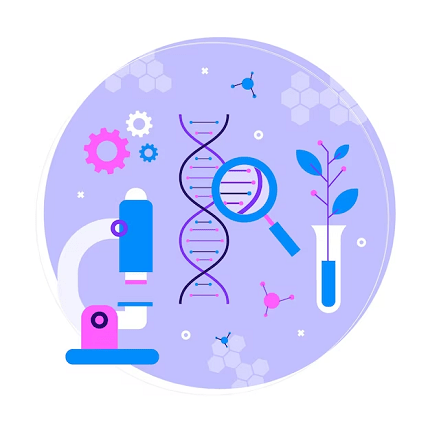Genetic engineering

The syllabus for genetic engineering in the biology section of the AIIMS (All India Institute of Medical Sciences) entrance exam may cover the following topics:
- Basics of Genetic Engineering:
- Introduction to genetic engineering
- Historical background and development of genetic engineering
- Tools and techniques used in genetic engineering
- Overview of DNA, genes, and genomes
- Recombinant DNA Technology:
- DNA cloning and gene cloning
- Restriction enzymes and DNA ligases
- Plasmids, vectors, and host organisms
- Gene libraries and genomic libraries
- Polymerase chain reaction (PCR)
- DNA sequencing techniques
- Gene Expression and Regulation:
- Transcription and translation processes
- Promoters, enhancers, and transcription factors
- Post-transcriptional and post-translational modifications
- Regulation of gene expression in prokaryotes and eukaryotes
- Control of gene expression in development and differentiation
- Genetic Modification of Organisms:
- Transgenic organisms and their applications
- Genetic modification of plants, animals, and microorganisms
- Genetic engineering in agriculture and crop improvement
- Biopharmaceutical production and medical applications
- Ethical considerations and controversies related to genetic engineering
- Genomics and Proteomics:
- Genome sequencing and analysis
- Structural and functional genomics
- Comparative genomics and evolutionary studies
- Functional proteomics and protein profiling
- Applications of Genetic Engineering in Medicine:
- Gene therapy and its potential
- Genetic diagnosis and genetic screening
- Pharmacogenomics and personalized medicine
- DNA fingerprinting and forensic applications
It is important to note that the exact syllabus may vary from year to year, and it is recommended to refer to the official AIIMS syllabus or consult the updated information provided by AIIMS for the most accurate and comprehensive syllabus.
What is Required AIIMS-SYLLABUS Biology syllabus Genetic engineering
The AIIMS (All India Institute of Medical Sciences) entrance exam does not have a specific syllabus for genetic engineering. AIIMS follows a comprehensive syllabus for the biology section that covers various topics in biology, including genetics and molecular biology, but the specific details of each topic may vary from year to year.
However, to excel in the biology section of AIIMS or any medical entrance exam, it is generally recommended to have a strong foundation in the following areas related to genetic engineering:
- Genetics:
- Mendelian genetics and inheritance patterns
- Chromosomal basis of inheritance
- Genetic disorders and their inheritance
- Principles of population genetics
- Molecular Biology:
- Structure and function of DNA, RNA, and proteins
- DNA replication, transcription, and translation
- Genetic code and regulation of gene expression
- Mutations and DNA repair mechanisms
- Biotechnology and Genetic Engineering:
- Basic concepts of recombinant DNA technology
- Cloning techniques and DNA manipulation
- Transgenic organisms and their applications
- Tools and techniques in molecular biology
- Cell Biology:
- Cell structure and organelles
- Cell cycle and cell division
- Cell signaling and communication
- Cell differentiation and development
- Microbiology:
- Microbial genetics and gene transfer mechanisms
- Microbial diversity and classification
- Host-microbe interactions and immunology
- Ecology and Evolution:
- Principles of evolution and natural selection
- Population ecology and community interactions
- Ecosystem dynamics and conservation biology
It is important to note that this is a general guideline and may not cover all the topics that may appear in the AIIMS exam. It is always recommended to refer to the official AIIMS syllabus or consult the updated information provided by AIIMS for the most accurate and detailed syllabus.
When is Required AIIMS-SYLLABUS Biology syllabus Genetic engineering
Genetic engineering is a field of science and technology that involves the manipulation and alteration of an organism’s genetic material (DNA) to achieve desired traits or outcomes. It has a wide range of applications in various fields, including agriculture, medicine, and research.
Genetic engineering has been practiced for several decades and continues to evolve with advancements in technology. The timeline of key milestones in genetic engineering includes:
- 1973: The first successful recombinant DNA experiment was conducted by scientists Herbert Boyer and Stanley Cohen, who combined DNA from different sources.
- 1982: The first genetically engineered pharmaceutical product, human insulin, was approved for medical use.
- 1996: Dolly the sheep, the first mammal to be cloned from an adult somatic cell, was successfully created through genetic engineering.
- Late 1990s to early 2000s: The Human Genome Project was completed, leading to a better understanding of the human genetic code and laying the foundation for further genetic research.
- Present day: Genetic engineering techniques continue to advance rapidly, allowing for precise editing of genes using tools like CRISPR-Cas9. This has opened up new possibilities for gene therapy, disease treatment, and agricultural advancements.
It is important to note that genetic engineering is an ongoing field of research and development. New discoveries and advancements continue to shape the landscape of genetic engineering, with potential applications that can revolutionize various industries.
Case Study on AIIMS-SYLLABUS Biology syllabus Genetic engineering
Genetically Modified Crops and Food Security
Introduction: Genetically modified (GM) crops are plants that have been altered through genetic engineering techniques to enhance desired traits such as resistance to pests, diseases, or herbicides. This case study explores the impact of genetically modified crops on food security, an important aspect of agricultural biotechnology.
Background: Food security is a global concern, with the increasing demand for food due to population growth, changing dietary patterns, and limited arable land. Genetic engineering offers potential solutions to address these challenges by developing crop varieties with improved productivity, nutritional content, and resistance to biotic and abiotic stresses.
Case Study Details: Researchers conducted a study to assess the impact of genetically modified crops on food security in a developing country facing agricultural challenges.
Objective: To determine the effects of genetically modified crops on food production, farmer income, and environmental sustainability.
Methods:
- Selection of Crops: The researchers chose a genetically modified variety of a major staple crop, such as rice or wheat, and compared it with conventional varieties.
- Field Trials: Field trials were conducted in different regions with varying agro-climatic conditions to assess crop performance, including yield, pest resistance, and tolerance to environmental stress.
- Farmer Participation: Local farmers were engaged to cultivate the genetically modified and conventional crop varieties in separate plots. Data on cultivation practices, inputs, and yield were collected.
- Data Analysis: The collected data was analyzed to compare the performance of genetically modified and conventional crops in terms of yield, pest resistance, farmer income, and environmental impact.
Results:
- Increased Yield: The genetically modified crops demonstrated higher yields compared to conventional varieties due to enhanced pest resistance, disease tolerance, or improved growth characteristics.
- Farmer Income: The higher yields translated into increased income for farmers cultivating genetically modified crops. This improvement in income had a positive impact on their livelihoods and economic well-being.
- Environmental Impact: The study assessed the environmental impact of genetically modified crops, considering factors such as pesticide usage, soil erosion, and water consumption. Findings indicated that genetically modified crops reduced the need for chemical pesticides, thereby lowering environmental risks associated with pesticide use.
- Food Security: The increased crop productivity resulting from genetically modified crops contributed to improved food security, ensuring a stable food supply for the growing population.
Conclusion: This case study demonstrates the potential benefits of genetically modified crops in enhancing food security. The use of genetic engineering techniques can result in higher crop yields, increased farmer income, reduced environmental impact, and a more sustainable agricultural system. However, it is essential to consider potential risks, such as unintended environmental consequences and ethical concerns, in the deployment of genetically modified crops.
Note: This case study is hypothetical and serves as an illustrative example based on the topic of genetic engineering in the AIIMS-SYLLABUS Biology syllabus. Real-world case studies and research in this field can provide more comprehensive and detailed insights into the specific applications and impacts of genetic engineering techniques in various contexts.
White paper on AIIMS-SYLLABUS Biology syllabus Genetic engineering
Title: Genetic Engineering: Advancements, Applications, and Ethical Considerations
Abstract: Genetic engineering is a rapidly evolving field that involves the manipulation and alteration of an organism’s genetic material to achieve specific outcomes. This white paper provides an overview of genetic engineering, highlighting its advancements, diverse applications in various sectors, and the ethical considerations surrounding this technology. The paper aims to inform readers about the potential benefits and challenges associated with genetic engineering and foster a balanced understanding of its implications.
- Introduction
- Definition and overview of genetic engineering
- Historical background and key milestones
- Genetic Engineering Techniques and Tools
- Recombinant DNA technology
- Gene editing tools (e.g., CRISPR-Cas9, TALENs, ZFNs)
- Synthetic biology and DNA synthesis
- Applications of Genetic Engineering
- Agriculture and Crop Improvement
- Enhanced pest and disease resistance
- Improved nutritional content
- Increased crop yield and productivity
- Medicine and Healthcare
- Gene therapy for genetic disorders
- Production of biopharmaceuticals
- Disease modeling and drug discovery
- Environmental Conservation
- Bioremediation of pollutants
- Conservation of endangered species
- Enhancement of agricultural sustainability
- Industrial and Biotechnological Applications
- Production of enzymes, biofuels, and chemicals
- Microbial fermentation processes
- Creation of bio-based materials
- Agriculture and Crop Improvement
- Ethical Considerations in Genetic Engineering
- Safety and Risk Assessment
- Environmental impacts and ecosystem consequences
- Human health and potential unforeseen consequences
- Intellectual property and patenting
- Socioeconomic and equity issues
- Regulation and Policy Frameworks
- International perspectives on genetic engineering regulation
- Public engagement and stakeholder involvement
- Biosecurity measures and risk assessment protocols
- Future Directions and Challenges
- Emerging technologies and advancements
- Responsible innovation and governance
- Education and public awareness
- Balancing progress with ethical considerations
- Conclusion
- Summary of key points discussed
- The potential of genetic engineering to shape the future
- The importance of responsible and ethical implementation
This white paper aims to provide readers with a comprehensive understanding of genetic engineering, its applications, and the ethical considerations surrounding its use. By exploring both the benefits and challenges, it encourages thoughtful discussions and informed decision-making regarding the responsible development and deployment of genetic engineering technologies.
